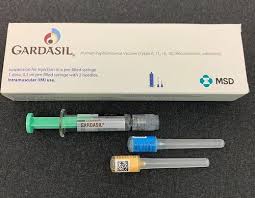Gardasil is a vaccine that helps protect against certain types of human papillomavirus (HPV), which can cause genital warts and cervical cancer. The vaccine is a recombinant quadrivalent vaccine that provides immunity against four types of HPV: 6, 11, 16, and 18.
Composition:
- Human Papillomavirus Quadrivalent (Types 6, 11, 16, and 18) Vaccine, Recombinant (NA)
Mechanism of Action:
Gardasil works by stimulating the immune system to produce antibodies that recognize and attack HPV types 6, 11, 16, and 18. These antibodies help to prevent the virus from causing infection and potentially leading to genital warts and cervical cancer.
Indications:
Gardasil is approved for the prevention of:
- Cervical cancer caused by HPV types 16 and 18.
- Genital warts caused by HPV types 6 and 11.
- Anal cancer caused by HPV types 16 and 18.
- Precancerous lesions in the cervix, vulva, and vagina caused by HPV types 6, 11, 16, and 18.
Dosage:
Gardasil is administered as a three-dose series:
- Dose 1: Administered at age 9-12 years.
- Dose 2: Administered at least two months after dose 1.
- Dose 3: Administered at least six months after dose 2.
Side Effects:
Common side effects of Gardasil include:
- Pain, redness, or swelling at the injection site.
- Fever.
- Headache.
- Fatigue.
- Muscle or joint pain.
- Allergic reactions.
Recommendation:
Gardasil is recommended for girls and boys aged 9-26 years old to protect against HPV-related diseases. The Centers for Disease Control and Prevention (CDC) recommends that all girls and boys receive the HPV vaccine as part of their routine vaccination schedule.
Important Note:
- Gardasil is not a treatment for existing HPV infections or genital warts.
- Pregnant women should not receive Gardasil unless they are at high risk of contracting HPV.
- Patients with a history of severe allergic reactions to any component of the vaccine should not receive Gardasil.
Special Precautions:
- Patients with a history of immunocompromising conditions should be closely monitored for signs of infection after receiving Gardasil.
- Patients with a history of bleeding disorders or anticoagulant therapy should be closely monitored for signs of bleeding after receiving Gardasil.
- Patients who are pregnant or breastfeeding should consult with their healthcare provider before receiving Gardasil.




Reviews
There are no reviews yet.